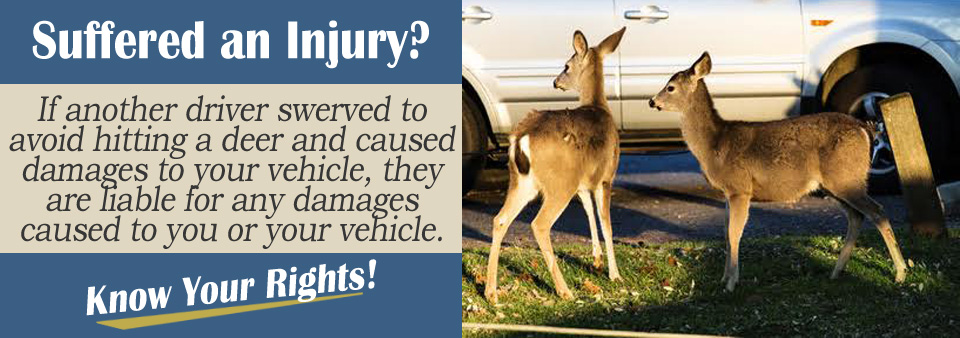Many things can happen in the blink of an eye. You could be driving along a road that is completely clear from distractions and suddenly a deer jumps into your path. What do you do? Many times, we react without thinking.
You may swerve to avoid hitting the deer, not considering the consequences of your actions before it is too late. What if you swerve and hit another car in the process? Are you still liable for the damages caused because of your actions?
We have asked attorney, Alaina Sullivan, about what you should do. Here is what she had to say:
The Answer Is…
Yes, the driver who swerved to avoid hitting a deer is still liable for damages caused to your vehicle. His or her actions were the reason for the accident and your damages were caused by his or her actions leading up to the collision.
Yes, the driver may not have intended to cause any harm when he or she instinctively swerved to avoid hitting the animal, but the fact remains that he or she hit your car upon no fault of your own. Therefore, that driver would be liable for your personal injury damages.
Reasonably Prudent Driver
Any driver on the road is charged with the duty of driving as a reasonable person would drive. This duty includes following the law and rules of the road and essentially using common sense in all situations. It applies to all drivers in pretty much all situations, including inclement weather and hazards on the road.
If you hit a patch of black ice and try to maintain a straight path on the road but are unable to do so and strike another car, even if you did not recklessly drive or intend to cause damage purposefully, the insurance company will look at whether your reaction was reasonable.
If a reasonable person would see that other cars were on the road when the deer jumps into his or her path, the insurance company or courts may not view the swerving as an action a reasonably prudent person would take. In these situations, it is often best to hit the deer instead of the other driver(s) on the road.

Mitigating Circumstance
The other driver could attempt to make the argument that all circumstances should be considered and request that his or her damages be reduced in consideration of these mitigating circumstances. This mitigation does not completely eliminate the duty that driver had to other drivers on the road and certainly will not wipe away the damages award owed.
However, if the insurance company looks at the entire picture and sees that the driver reasonably thought he or she had no other option to avoid a catastrophic event, the company may reduce the amount of damages owed by a small percentage based on the amount the specific circumstances played into the accident. It is not a guaranteed reduction by any means, but it is always a consideration.
Contact an Attorney Today
If you are the victim of a car accident, it is always recommended you speak with an attorney to discuss your case. A licensed personal injury attorney will be able to evaluate your case and determine if you have a claim against the other party’s insurance company.
To receive the compensation for your medical bills, property damages, and pain and suffering, you should speak with a personal injury attorney in your area today.
